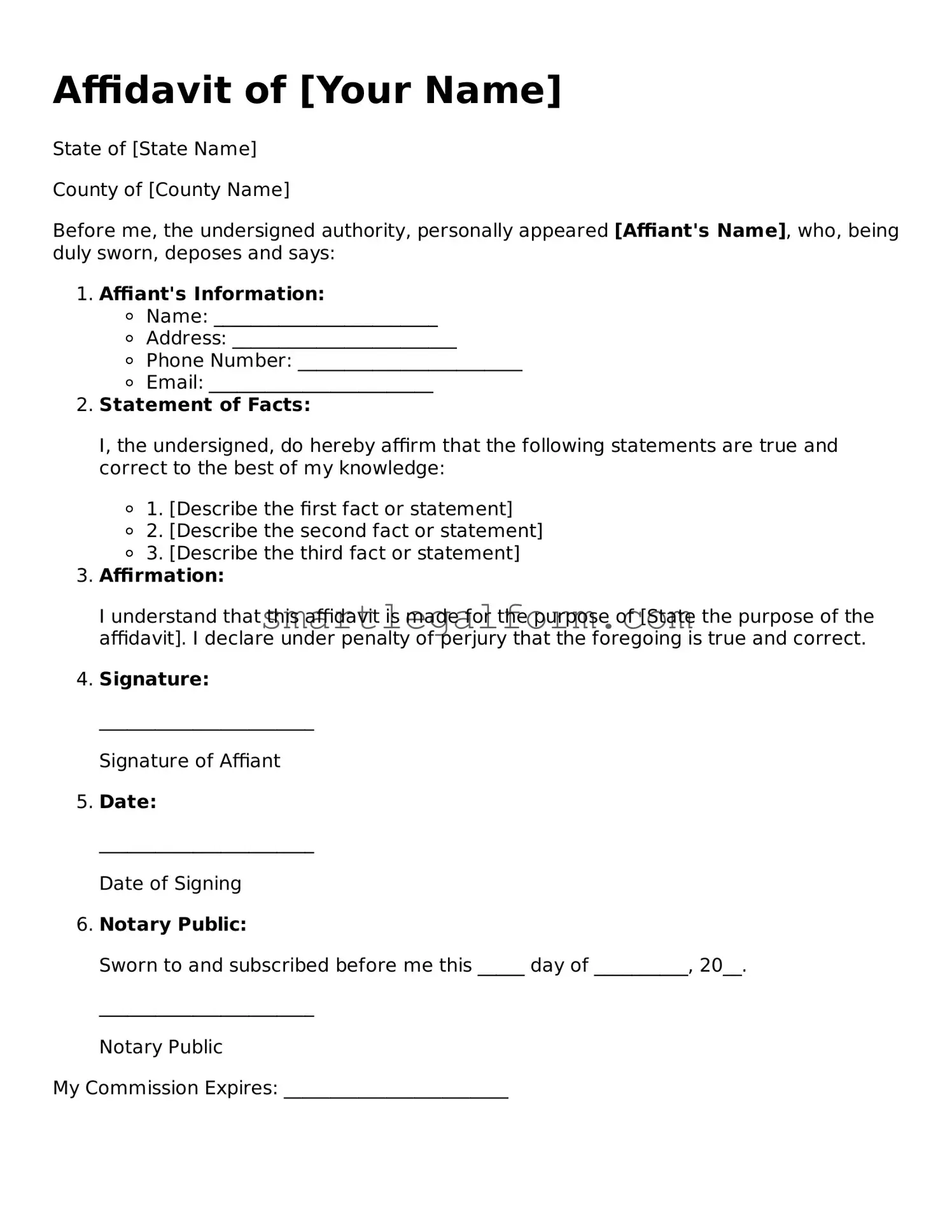Attorney-Approved Affidavit Form
Form Preview Example
Affidavit of [Your Name]
State of [State Name]
County of [County Name]
Before me, the undersigned authority, personally appeared [Affiant's Name], who, being duly sworn, deposes and says:
- Affiant's Information:
- Name: ________________________
- Address: ________________________
- Phone Number: ________________________
- Email: ________________________
- Statement of Facts:
- 1. [Describe the first fact or statement]
- 2. [Describe the second fact or statement]
- 3. [Describe the third fact or statement]
- Affirmation:
- Signature:
- Date:
- Notary Public:
I, the undersigned, do hereby affirm that the following statements are true and correct to the best of my knowledge:
I understand that this affidavit is made for the purpose of [State the purpose of the affidavit]. I declare under penalty of perjury that the foregoing is true and correct.
_______________________
Signature of Affiant
_______________________
Date of Signing
Sworn to and subscribed before me this _____ day of __________, 20__.
_______________________
Notary Public
My Commission Expires: ________________________
Common mistakes
Filling out an Affidavit form can be straightforward, but many people make common mistakes that can lead to complications. One frequent error is not providing complete information. When sections are left blank or filled out with vague responses, it can create confusion. Every detail matters. Ensure that you answer all questions fully and clearly.
Another mistake is failing to sign the Affidavit in the presence of a notary. A notary’s role is crucial; they verify your identity and witness your signature. If you skip this step, your Affidavit may not be valid. Always make sure to sign your document in front of a notary public.
Additionally, some individuals overlook the importance of being truthful. An Affidavit is a sworn statement, and lying or providing false information can have serious consequences. Always double-check your facts before submitting the form. Honesty is not just the best policy; it’s a legal requirement.
Lastly, many people forget to keep a copy of the completed Affidavit. This document serves as an important record, and having a copy can be helpful for future reference. After you have filled out and signed the Affidavit, make sure to make a photocopy or scan it for your records.
Dos and Don'ts
When filling out an Affidavit form, attention to detail is crucial. Here are some important dos and don’ts to guide you through the process.
- Do read the instructions carefully before starting.
- Do provide accurate and truthful information.
- Do sign the affidavit in front of a notary public.
- Do keep a copy for your records after submission.
- Do double-check for any required attachments or supporting documents.
- Don't leave any sections blank unless instructed.
- Don't use vague language; be specific in your statements.
- Don't sign the affidavit without understanding its contents.
- Don't submit the form if you are unsure about any information.
By following these guidelines, you can ensure that your Affidavit form is completed correctly and effectively. Remember, accuracy and clarity are key to a successful submission.
Common Templates:
Bbb File a Complaint - Hidden fees were charged without prior notice.
A Florida Power of Attorney form is a legal document that grants one person the authority to act on another person's behalf in legal and financial matters. This tool can prove invaluable during times when someone is unable to manage their affairs due to illness, absence, or incapacity. For more information on how to create and use this important document, you can visit toptemplates.info, which provides further insights into safeguarding one's interests effectively.
Sample Letter of Intent to Homeschool - Many families find that submitting this letter sets a positive tone for their homeschool journey.
Profits or Loss From Business - It provides a clear format for listing various sources of business income.
Similar forms
- Declaration: Similar to an affidavit, a declaration is a written statement made under penalty of perjury. It does not require notarization but serves a similar purpose in legal proceedings.
- Affidavit of Support: This document is used in immigration cases to demonstrate that a sponsor has the financial means to support an immigrant. Like a standard affidavit, it is sworn to be true under oath.
- Sworn Statement: A sworn statement is a formal declaration made under oath. It shares the same legal weight as an affidavit, often used in legal matters to verify facts.
- Power of Attorney: While primarily granting authority to another person, a power of attorney can include sworn statements regarding the principal's wishes. Both documents require a signature and may need notarization.
- Witness Statement: This document outlines the account of a witness regarding an event. It is often sworn, similar to an affidavit, and can be used in court to support a case.
- Quitclaim Deed: This legal document transfers interest in real estate without warranty, often used between family members. To learn more about this document, click here to get the document.
- Certification: A certification is a formal statement confirming the truth of certain facts. It may not always require an oath, but it often holds similar importance in legal contexts.
- Testimony: Testimony is a formal statement made in court under oath. While it occurs in a courtroom setting, the principles of truthfulness and legal accountability align closely with those of an affidavit.
- Notarized Statement: This is a statement that has been signed in the presence of a notary public. Like an affidavit, it serves as a verified account of facts and can be used in legal situations.
- Legal Notice: A legal notice is a formal communication regarding legal rights or obligations. While not sworn, it often requires accurate representation of facts, similar to the intent behind an affidavit.
